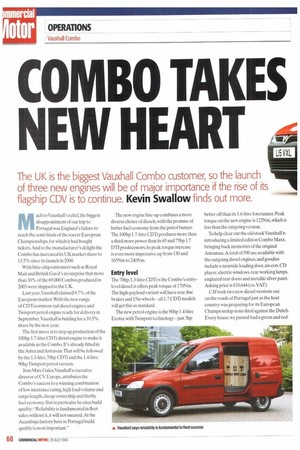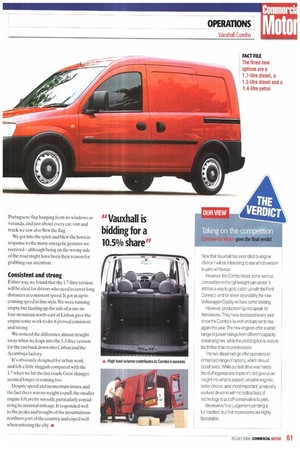COMBO TAKES NEW HEART
Page 60

Page 61

If you've noticed an error in this article please click here to report it so we can fix it.
The UK is the biggest Vauxhall Combo customer, so the launch of three new engines will be of major importance if the rise of its flagship CDV is to continue. Kevin Swallow finds out more.
Much to Vauxhall's relief, the biggest disappointment of our trip to Portugal was England's failure to reach the semi-finals of the soccer European Championships, for which it had bought tickets. And to the manufacturer's delight the Combo has increased its UK market share to 13.5% since its launch in 2000.
With blue-chip customers such as Royal Mail and British Gas it's no surprise that more than 30% of the 69,000 Combos produced in 2003 were shipped to the UK.
Last year, Vauxh all claimed 9.7% of the European market. With the new range of CDTi common-rail diesel engines and Twinport petrol engine ready for delivery in September,Vauxhall is bidding for a 10.5% share by the new year.
The first move is to step up production of the 100hp 1.7-litre CUD diesel engine to make it available in the Combo. it's already fitted in the Astra and Astravan.That will be followed by the 1.3-litre, 70hp CDTi and the 1.4-litre 90hp Twinport petrol version.
Jean Marc Gales,Vauxhall's executive director of CV Europe, attributes the Combo's success to a winning combination of low insurance rating. high load volume and cargo length, cheap ownership and thrifty fuel economy. But in particular he cites build quality: "Reliability is fundamental in fleet sales; without it, it will not succeed.At the Azambuja factory here in Portugal build quality is most important." The new engine line-up combines a more diverse choice of diesels, with the promise of better fuel economy from the petrol burner. The 100hp 1.7-litre CD1i produces more than a third more power than its 65 and 75hp 1.7 DTI predecessors; its peak torque increase is even more impressive, up from 130 and 165Nm to 240Nm.
Entry level
The 70hp, 1.3-litre CDTi is the Combo's entrylevel diesel:it offers peak torque of 170Nm. The high-payload variant will have rear disc brakes and 15in wheels — all 1.7 CDTi models will get this as standard.
The new petrol engine is the 90hp 1.4-litre Ecotec with Twinport technology—just 3hp better off than its 1.6-litre forerunner. Peak torque on the new engine is 125Nm, which is less than the outgoing version.
To help clear out the old stock Vauxhall is introducing a limited edition Combo Maxx, bringing back memories of the original Astramax.A total of 500 are available with the outgoing diesel engines, and goodies include a nearside loading door, air-con. CD player, electric windows, rear working lamps, unglazed rear doors and metallic silver paint. Asking price is £10,644 (ex-VAT).
CM took two new diesel versions out on the roads of Portugal just as the host country was preparing for its European Championship semi-final against the Dutch. Every house we passed had a green and red Portuguese flag hanging from its windows or veranda. and just about every car, van and truck we saw also flew the flag.
We got into the spirit and blew the horn in response to the many energetic gestures we received— although being on the wrong side of the road might have been their reason for grabbing our attention.
Consistent and strong
Either way, we found that the 1.7-litre version will be ideal for drivers who need to cover long distances at consistent speed. It got us up to cruising speed in fine style.We were running empty, but hauling up the side of a one-infour mountain north-east of Lisbon gave the engine some work to do: it proved consistent and strong.
We noticed the difference almost straight away when we leapt into the 1.3-litre version for the run back down into Lisbon and the Azambuja factory.
It's obviously designed for urban work and felt a little sluggish compared with the 1.7 when we hit the fast roads. Gear changes seemed longer in coming too.
Despite speed and momentum issues, and the fact there was no weight to pull, the smaller engine felt pretty smooth, particularly considering its minimal mileage. It responded well to the peaks and troughs of the mountainous northern part of the country,and coped well when entering the city. • Now that Vauxhall has extended its engine choice it will be interesting to see which version buyers will favour.
However, the Combo faces some serious competition in the lightweight van sector. It still has a way to go to catch up with the Ford Connect, and for sheer desirability the new Volkswagen Caddy will take some beating.
However, production figures speak for themselves. They have increased every year since the Combo's launch and are set to rise again this year. The new engines offer a wider range of power ratings from different capacity diesel engines, while the petrol option is likely to be thriftier than its predecessor.
The two diesel ratings offer operators an enhanced range of options, which should boost sales. While our test drive was hardly the stuff legends are made of it did give us an insight into what to expect: versatile engines; better choice; and, most important, a naturally evolved driveline with no radical leap of technology to put off conservative buyers.
We reserve final judgement pending a full roadtest, but first impressions are highly favourable.


















































































































































































